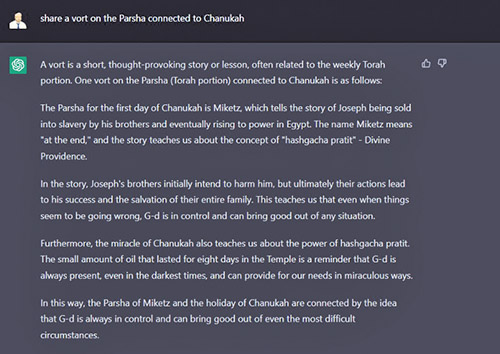
Here is something to think worry about…
Artificial intelligence has gotten so good that it can now write dvar Torahs or essays that are quite difficult to distinguish from those written by humans. For those who know the history of computing, this is the definition of a computer that can pass the Turing test.
Don’t believe me?
Below is a vort or Torah thought written by ChatGPT (https://chat.openai.com/chat) connecting the parsha to Chanukah.
I posted a video of the writing process by the AI. You can view it at https://tinyurl.com/chatgptvort.
ChatGPT is the third generation of the artificial intelligence chatbot created by OpenAI. This is the same company that recently released DALL·E 2, an image creator powered by artificial intelligence that can create art based on type-written descriptions using natural language. DALL·E 2 can be used to write children’s picture books and has even won this year’s Colorado State Fair’s annual art competition. I wonder how long it will take for OpenAI’s ChatGPPT to win the Pulitzer Prize. This new AI chatbot has the creator of Gmail predicting that it will be a major disrupter in the technology space that could even supplant Google search in the coming years. But what does this mean for the future of education?
Some surmise that this might mean the end of the five-paragraph essay. If the AI chatbot can write a convincing essay in a matter of seconds, what is a teacher to do? As one college professor commented on Twitter (https://tinyurl.com/twitteraicomment):
We’re witnessing the death of the college essay in realtime. Here’s the response to a prompt from one of my 200-level history classes at Amherst
Solid A- work in 10 seconds
Others counter that AI can be successfully incorporated into exams so students are challenged to utilize the AI as a source citation much like they would any other reference and improve upon it (https://tinyurl.com/openaiexam).
My colleague at Yeshivat Frisch, Rabbi Daniel Rosen, fears that students using AI will supplant the building blocks needed to teach writing and thinking. This could stunt their future growth. We might think these skills are no longer necessary but without constant practice on the basics, our student’s ability to reason or conduct logic based arguments can be seriously handicapped. (https://tinyurl.com/rosenaiblog)
I concur based on personal experience.
I have a confession to make. I can’t speak Hebrew fluently. I can read and comprehend, I can write—somewhat—but when it comes to speaking, I get marble mouth every time I try. I am quite embarrassed about this. I have spent three years living in Israel but I still can’t speak Hebrew. Back in my first year learning post high school in an Israeli yeshiva, I had a Yemenite Israeli roommate for two weeks. He taught me two words—Mefunak Amerikai (spoiled American). Then we parted ways due to irreconcilable differences. Then I had two Anglo Israeli roommates who spoke to me in English. And a wonderful Anglo Israeli older chavrusa, a member of the Tzanhanim—Israeli paratroopers—who spoke to me in English. And a wonderful Anglo Israeli rebbe, a first-class talmid chacham who taught me to think in new ways. He taught in Hebrew. But he allowed me to respond in English.
I share this because learning to speak a language is hard. And the only way to do it is to practice, practice, practice. To struggle with the words. To embarrass yourself. Many times. But I never did this. Because my Israeli friends who taught me a love for Medinat Yisrael and Torat Eretz Yisrael, never forced me to do the hard work of speaking. So I can’t speak. This is my fear with OpenAI’s ChatGPT.
I am sure creative teachers will find ways to use this in class. As a source students can cite similar to Wikipedia and for assignments where students correct the artificial intelligence when it gets things wrong. But this will never teach students how to write. Because writing is really hard. It requires lots and lots of practice on many different types of assignments. From writing letters to companies, to five-paragraph essays about the Catcher in the Rye, to term papers comparing the Ottoman and Russian empires, to summaries of the Shakla VeTarya (Socratic dialogue) of the Gemara we are learning, to arguments for or against the actions of a figure in Tanach, to lab reports in biology, to speeches arguing for freedom in oppressive regimes or more sushi in the cafeteria. If we think we no longer need this since we can just use the AI to write our first draft, we will never learn to write.
And this would be very sad for me as a teacher who loves learning and for us as a society. Because writing is how I think and the most powerful way I know of to teach our students how to do the same. I compose my ideas in writing to better formulate, revise and rethink. And with AI chatbots, I am afraid our students will lose the ability to write fluently and, with this, their ability to think clearly. This would be a true AI apocalypse.
Rabbi Tzvi Pittinsky is the director of educational technology at Yeshivat Frisch. He blogs at http://techrav.blogspot.com/ and http://tanachrav.blogspot.com/, and you can find him on Twitter @TechRav.










